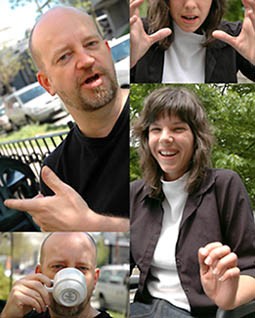
[Editor’s note: The Citizens Assembly is taking a hard look at dropping B.C.'s current approach to electing politicians, the 'first past the post' approach that awards each seat to the highest vote getter in each riding. Instead, the Assembly is considering a shift to the European-style 'proportional representation' model that sends politicians to the legislature in proportion to the overall votes cast for their party provincewide. ]
Would that be good for British Columbians? The Tyee asked Green party school trustee Andrea Reimer and former NDP advisor Bill Tieleman to trade views on the issue via email. As you can see, they didn't agree.
Andrea Reimer: Give us more reason to vote
Bill, the latest Ipsos Reid poll was a depressing reminder that most British Columbians see little to vote for and a lot to vote against. In fact fewer and fewer people are voting at all.
In 1991 I became a statistical anomaly: a 19-year-old voter (four out of five under 25s aren't). Although many friends enthusiastically participated in other parts of the democratic process, none would visit the voting booth. Maybe I would've stuck to rallies too if I'd understood how little my vote mattered both on and in between election day.
Voting systems drive the nature of politics. A good system creates accountable government by ensuring fair representation where all votes count equally. Conversely, a bad system distorts or discounts what voters want, over-representing one viewpoint while under-representing or eliminating others altogether.
Sounds a lot like BC.
But rather than dwell on bad systems, let's talk about a good one. Proportional Representation (PR) is the world's most widely used voting system. While PR systems can be designed in many ways, the idea is very simple. If a party receives 58 percent of the popular vote, that party receives 58 percent of the seats. If another party wins 21 percent, that party gets 21 percent of the seats.
Imagine how much different our province would be today if British Columbians could have voted for what they wanted in 2001 rather than against. To paraphrase Eugene Debbs, I'd rather vote for what I want and get it.
Bill Tieleman: Citizens' Assembly doesn't get it
Andrea, the battle for the hearts and minds of voters is on.
No, not a federal election.
I'm talking about the deliberations of our unique Citizens' Assembly on Electoral Reform. Gordon Campbell's policy-wonk idea was to pick ordinary British Columbians at random and in some perverse version of jury duty, ask them to redesign our electoral system.
And the early results are discouraging for those who expect them to at least get their facts straight.
The Assembly's preliminary statement issued March 21 is disconcerting for the way it characterizes the "problem" with our existing electoral system.
"Adversarial politics often result in sharp swings in public policy as newly elected governments often undo or reverse the programs of their predecessors. This style of politics contributes to a growing alienation of voters from the political process which has been reflected in falling voter turnout rates, especially among young voters," the Assembly states.
Wrong, wrong, wrong. Voter turnout rates are actually not falling at all.
In the May 2001 election, a strong 70.95 percent of B.C. registered voters came out to cast a ballot. In 1996, an even stronger 71.5 percent of registered voters went to the polls.
Those turnouts are higher than every single election between 1952 and 1979 except one. They are only slightly lower than turnouts in years like 1933 that saw a 73 percent turnout and 1991, that experienced a near-record 75 percent participation rate.
It should concern all voters that the Citizens' Assembly, after its months of deliberation, doesn't even understand the problem — but is busily designing a solution.
Reimer: Liberals elected by one in three
Bill, you've stumbled on a confusing byproduct of our failed electoral system. Unlike most jurisdictions in the world, the made-in-B.C. voter turn out statistics report only registered voters who vote, overlooking the embarrassingly high number of eligible voters who aren't registered.
Follow those numbers and you'll see that real voter participation is sinking like a stone from historical highs of 75 percent to an all time low of 55.09 percent in the 2001 election (1,599,864 of 2,904,200 eligible voters participated: Elections BC report).
What may surprise you more, is that the B.C. Liberals, with their whopping 'majority', were elected by less than one in three eligible voters. Speaking of problems, there's the nub of ours here in B.C.: such great imbalances between power and public support are fated for gigantic public policy failures.
Obviously this hasn't been a problem just on the right. The NDP was destined for ignominy before the last ballot was counted in 1996. With just one in four eligible voters supporting the NDP, it was easy for the Liberals to relentlessly campaign against and subsequently dismantle the last decade's hard won policy increments.
The opportunity exists with PR to get off this teeter-totter and build governments with the majority mandate they need to enact good policies that endure more than one government's tenure. The Citizen's Assembly sees the intrinsic value in this, as I believe any reasonable person looking at a complete set of facts would, including you Bill. To learn what the Citizen's Assembly is learning, visit www.citizensassembly.bc.ca
Tieleman: Cure too radical for what ails
Come on Andrea, saying we have to change our entire electoral system because there are too many unregistered citizens not voting is like saying we have to build all new schools because our high school graduation rate is too low!
If voters aren't registered, the problem is enumeration — which obviously hasn't been enough of a priority.
And let's not forget two significant changes in voting rules that increased the number of voters eligible but decreased the percentage participating in elections. In 1982 persons "without an adequate knowledge of English or French are no longer disqualified from voting". And in 1992 the voting age was reduced to 18 years from 19. We know historically that young people and citizens with English as a second language vote in far lower percentages than other voters.
So sure, let's get everyone registered. But don't confuse an inadequate voters' list and other factors with a demand for proportional representation.
Not that I'm surprised — it's in the Green Party's overwhelming self-interest to change to a proportional representation system that might allow Greens to win a few seats.
But if you really want voter participation, Andrea, let's just make it compulsory, like in Australia, where 95 percent of registered voters cast a ballot in 2001.
Reimer: Legislature seats out of whack
It looks like we can agree that voter turnout is, in fact, low. But all this statistical banter misses the point: low turnout is a symptom of much bigger problems.
When people vote, their vote should count.
When parties receive a percentage of the vote, they deserve fair representation of that support.
When public policy is made, it needs a mandate from a majority of people so it can endure more than one electoral cycle.
Isn't it odd that 97 percent of the legislative seats can be awarded to one party when clearly it's not the wish of the electorate? Doesn't it seem weird that every election cycle, laws can be rewritten and contracts torn up as though they never existed?
Our voting system is an artifact of our colonial past, scrapped by most major democracies more than 50 years ago (it's pretty much us, India, the US and the old mother ship, England, left). Maybe it made sense when all voters were white male property owners but as BC becomes increasingly more diverse, we need a robust voting system that allows fair and democratic representation.
And speaking of gender, did I mention that pro-rep systems elect, on average, twice as many women? You can call that self-interest but I'd call it good democracy.
Tieleman: Leave choice to each community
The fundamental difference between your position, Andrea, and mine is that I believe each community should decide which party best meets its interests and which candidate can most ably represent it.
That's why in B.C. we have 79 different ridings and 79 separate election results to democratically choose our representatives, with the party that wins a majority of support in communities across the province becoming our government.
To form government, parties are required to compromise and appeal to the most voters they can with a program that meets approval in a broad range of different communities, rural and urban.
The Green Party and other small parties have been unable to win the support of even a single community — that's why they so strongly support proportional representation — out of self-interest.
But shouldn't a provincial election be about ensuring that a government has the support of a majority of our communities?
Our first-past-the-post system isn't perfect but it doesn't take power away from communities and hand it over to political parties to make backroom deals to form coalition governments, where narrow interests decide who is in power, as happens under proportional representation.
I reject a system where parties with as little as five percent of the vote get to determine who forms government and the high price for their support.
But regardless of what Andrea or I think, it's now up to the Citizens' Assembly and then to voters in the May 17 election to decide what kind of electoral system they want. It's a worthy debate about democracy — thank goodness we can even have it!
Vancouver School Board member Andrea Reimer is a Green Party member, executive director of Western Canada Wilderness Committee, a founder of Strait Communications, and is actively involved with People for Pro Rep.
West Star Communications president Bill Tieleman writes a column on B.C. politics in the Georgia Straigh, appears Thursdays on CBC TV's Canada Now and regularly on CBC's Early Edition and other media. He was communications director in both the NDP premier's office and the BC Federation of Labour. ![]()
Read more: Politics















Tyee Commenting Guidelines
Comments that violate guidelines risk being deleted, and violations may result in a temporary or permanent user ban. Maintain the spirit of good conversation to stay in the discussion.
*Please note The Tyee is not a forum for spreading misinformation about COVID-19, denying its existence or minimizing its risk to public health.
Do:
Do not: